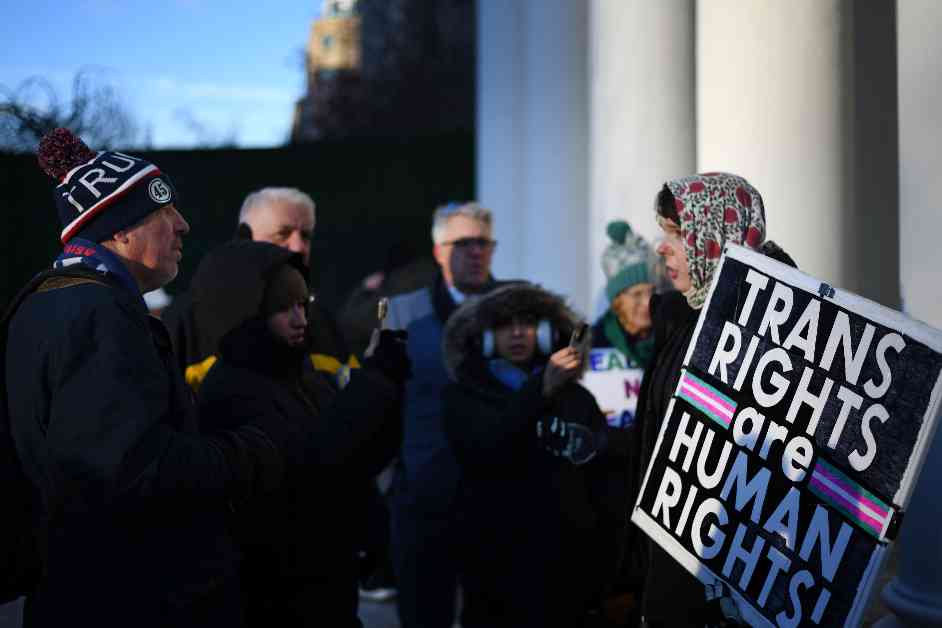Trump Administration Escalates Reversal of Trans Rights with Gender-Affirming Care Order
President Donald Trump made headlines on Tuesday with an executive order that further undermines transgender rights by restricting government-funded insurance coverage for puberty blockers and surgery for individuals under 19. Titled “Protecting Children From Chemical and Surgical Mutilation,” the order is poised to spark legal battles and requires congressional or regulatory action for full implementation. Despite its immediate impact, the order has stirred concerns among transgender individuals and their advocates, who fear that it will deter crucial medical procedures and complicate access to gender-affirming care.
The Trump administration’s swift onslaught against the trans community in recent weeks has left many reeling. From rejecting the term “gender” entirely to enforcing strict gender recognition policies, the president’s actions have sent shockwaves through the LGBTQ+ community. Parents of transgender children are particularly alarmed, feeling helpless in the face of these discriminatory measures. A Missouri resident, who remains anonymous out of fear of reprisal, expressed deep anguish over the political climate that threatens the safety and well-being of their family. The growing sense of despair and uncertainty among these families is a stark reminder of the human toll of policy decisions.
The statistics paint a sobering picture of the transgender youth population in the United States. An estimated 300,000 children between the ages of 13 and 17 identify as transgender, yet only a fraction seek gender-affirming care. A joint analysis by Reuters and Komodo Health revealed that fewer than 15,000 patients aged 6 to 17 with a gender dysphoria diagnosis received hormone therapy, and fewer than 5,000 started puberty-blocking medications between 2017 and 2021. Despite the relatively small numbers, the impact of Trump’s order on these vulnerable individuals is cause for concern.
Implications of the Executive Order
Trump’s directive to curtail insurance coverage for young people undergoing transition processes carries far-reaching consequences. The Williams Institute highlighted the potential barriers to gender-affirming care resulting from the order, warning of increased risks for both providers and recipients. While the immediate effects may be limited, the broader implications for federal health insurance programs and private-sector coverage remain uncertain. Legal challenges from states and advocacy groups are expected as efforts to challenge the order gain momentum.
The executive order specifically targets several government programs, including Tricare, Medicare, Medicaid, federal health benefit programs, and the Foreign Service Benefit Plan. By instructing the Department of Health and Human Services to cease insurance coverage for gender-affirming treatments, Trump’s administration is taking a decisive stance against transgender individuals’ access to essential medical care. The lack of clarity surrounding the order’s impact on various insurance plans underscores the need for comprehensive legal analysis and advocacy to safeguard transgender rights.
State Medicaid programs play a crucial role in shaping access to transgender care, with significant variations across states in coverage policies for minors. The Movement Advancement Project’s map illustrates the diverse landscape of transgender healthcare coverage, highlighting the disparities that exist nationwide. Trump’s order introduces a new layer of complexity to an already fragmented system, raising concerns about the potential erosion of healthcare rights for transgender youth.
The Human Toll of Policy Decisions
The personal stories of families grappling with Trump’s executive order underscore the profound impact of policy decisions on individuals’ lives. Andrew Ortiz, a senior policy attorney at the Transgender Law Center, emphasized the detrimental effects of the order, shedding light on the administration’s broader agenda. Ortiz’s poignant words resonate with many who view the order as a direct attack on the transgender community, signaling a troubling shift in federal policy.
Julian Polaris, a partner at Manatt, highlighted the broader implications of the order, noting the government’s willingness to restrict access to critical services for marginalized populations. The move has drawn sharp criticism from LGBTQ+ advocacy groups, including Planned Parenthood Federation of America, which condemned the demonization of transgender youth and misinformation spread by the administration. The urgency of protecting transgender rights and ensuring access to gender-affirming care has never been more pressing.
As the fight for transgender rights intensifies, the battle lines are drawn between policy makers and advocates seeking to uphold fundamental human rights. Trump’s executive order represents a pivotal moment in the ongoing struggle for equality and justice, underscoring the need for solidarity and unwavering commitment to protecting the rights of all individuals. The road ahead may be fraught with legal challenges and resistance, but the voices of those affected by these policies will continue to resonate, driving the fight for a more inclusive and equitable society.

















